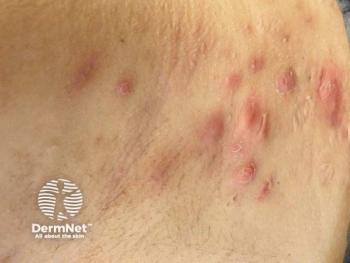
Future technology could make psoriasis pills, injections obsolete
Key Takeaways
- Synthetic biology-based gene circuits autonomously detect disease biomarkers and produce therapeutic proteins for psoriasis treatment.
- Designer cells convert pro-inflammatory cytokines TNF and IL22 into anti-inflammatory cytokines IL4 and IL10, preventing or curing psoriatic flares.
A novel cell-based strategy tested in mice can detect the onset of psoriasis flares by measuring disease biomarkers and then release therapeutic proteins to stop progression. Future implications are exciting.
Researchers have developed a novel cell-based strategy for the treatment of psoriasis. Their synthetic biology–based gene circuits “can autonomously couple the detection of disease biomarkers with the production of therapeutic proteins,” according to a
“Implanted designer cells detect the onset of psoriatic flares by measuring the psoriasis-associated proinflammatory cytokines TNF and IL22 in the bloodstream and produce, secrete and systemically deliver the anti-inflammatory cytokines il4 and IL10 which prevents psoriatic flares or cures them. Thus, the cytokine converter converts pro-inflammatory cytokines (TNF and IL22) into anti-inflammatory cytokines (IL4 and IL10),” the study’s senior author Martin Fussenegger, Ph.D., professor of biotechnology and bioengineering, ETH Zurich, in Switzerland, told Dermatology Times.
In a study of mice, the designer cells prevented psoriatic flare onset, stopped acute psoriasis, improved psoriatic skin lesions and restored normal skin-tissue morphology.
If it pans out in humans, the technology could be a game-changer for dermatologists and their psoriasis patients, according to Dr. Fussenegger.
“In the future, dermatologists could implant engineered autologous cells containing the cytokine converter and the implanted device takes full control of the therapy,” Dr. Fussenegger says. “Biologics such as IL4 and IL10 have proven promising in clinical trials, but the half-lives has been found to be too short for an economic therapy. Cell-based in situ production of biopharmaceuticals by implanted designer cells at the right time and dose will expand treatment opportunities of biologics.”
Dr. Fussenegger and colleagues have plans to develop this technology for human clinical trials.
“If successful, we expect this device to go commercial within the next 10 years,” he says.
Reference:
Schukur L, Geering B, Charpin-El Hamri G, Fussenegger M.
Newsletter
Like what you’re reading? Subscribe to Dermatology Times for weekly updates on therapies, innovations, and real-world practice tips.










